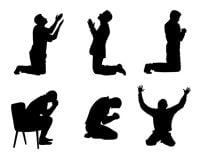
Forgiveness
Jesus is very clear that forgiveness is a vitally important part of Christian living. Yet it is not a concept that is easy to understand let alone carry out. Popular culture certainly does not forgive. If a public figure makes a gaffe and then apologises, the media sounds almost disappointed at having their outrage thwarted but then ignores the apology and presses on with their judgement and derision toward the sinner. Should people who hurt others very badly ever be forgiven? Popular culture seems to be saying a definite NO. In our private lives do we hold grudges for years and years against people who have wronged us?
I was struck by the words of a Muslim man from New Zealand. His wife had been killed in the massacre at the New Zealand Mosque. Where 50 people died
He had lost his wife in the attack but he said he did not want hate and anger in his heart. He had faith, love and mercy for this man and he forgave him. What depths of faith this man had. Yet, as far as we know, the terrorist is not repentant. So how does forgiveness work in this instance?
Typically when we are wronged we feel hurt, put down, depleted, and damaged. We may feel like a powerless victim. Then anger follows. The adrenalin generated by anger lifts our spirits and makes us feel better. If anger is fuelled by hate leading to revenge or at least revenge fantasies, then we feel even better, at least for a short time. Such anger keeps the adrenalin going but is soon followed by a dose of cortisol as the body seeks to bring down the elevated adrenalin levels. Then we feel worse. So another round of revenge fantasies keeps the hate and anger going and keeps us feeling better again – more powerful, less like a loser. Alternatively we may bury the pain. Numb ourselves to what has happened and this can have a detrimental effect on our health and may lead to depression.
What is a Christian to do?
The bible is very clear. “Vengeance is mine. I will repay says the Lord.” Hebrews 10:13. My grandfather was a Methodist Minister and he raised his children on this verse. You are never to take revenge on others. God will deal with wrong doers. Their punishment is not your business. In turn my mother drummed this into my brothers and me. Recently I discovered that some of my cousins could recite this verse as well. It seems it has also been drummed into grandfather’s descendants.
So what are we to do when we have been harmed? Are we just supposed to suffer?
Lets look at Jesus’ life for some clues. Jesus was fully human as well as being fully divine. He suffered as much as any other human being suffers when they are harmed either physically or emotionally. Life was hard for Jesus whose words and work were opposed at every turn.
How did Jesus forgive the people he needed to forgive? How did he forgive the horrible actions of people toward him? He had to put up with betrayal, lack of understanding of friends and family and indeed their anger when they tried on one occasion to throw him off a hill. He had to put up with the bad behaviour of his disciples, who also went to sleep when he most needed their support. He had to endure the false accusations of the religious leaders who called him a liar, a drunkard, crazy and a blasphemer.
Jesus was fully human. Do we really think it was easy for him to love his enemies, because to love them he had to forgive them.
He did not however condone their sinful behaviour. He never said that what they were doing didn’t matter. However he bore them no ill will.
How did Jesus manage this? How do we manage situations when we are hurt and harmed.
Throughout his ministry Jesus taught the gospel of love and forgiveness.
“And if the same person sins against you seven times a day and turns back to you seven times and says, “I repent” you must forgive.” Luke 17:4
“Forgive us our sins as we forgive those who sin against us.” The Lord’s Prayer
The Prodigal Son is a story of a father’s forgiveness for his errant son.
How do we follow Jesus’ example? There is a process we can follow when we look at Jesus’ life.
THE PROCESS OF FORGIVENESS.
First Jesus prayed.
He went off into the hills, or off somewhere on his own and he prayed a lot. I believe that he talked to God about his life. The difficulties, the obtuseness of the people, the hurt of trejection, the bullying, the betrayal, the misunderstanding, the hard life of itinerant preacher. Jesus prayed and asked God to help him forgive.
We too can tell God about it. Get angry with God if necessary. Experience anger toward your attackers. Confide all of it, every detail, every feeling. Writing it all out in full can be very helpful and then destroy the piece of paper. This allows God to begin to lift that burden of upset and hate. Its hard to let go of hate because it feels so good. Only God can begin to loosen the hold that hate and revenge fantasies can have on us.
Second Jesus fully experienced the pain.
Jesus refused the wine when it was first offered to him on the cross. He didn’t numb anything and he didn’t pretend that the experience was easier than it really was.
Again for us, writing it out can be very helpful to identify the pain. If we don’t do this and we try to numb the pain by ignoring it, we risk internalising the pain and this can lead to depression.
Third Jesus did not take revenge on anyone.
Do you remember in the garden of Gethsemane when Peter cut off the soldier’s ear, Jesus healed the ear. During his trial, he said nothing. Vengeance belongs to God, not us.
Fourth when he was hanging on the Cross, Jesus did not directly forgive anyone.
When the pain and the physical, mental and emotional agony was too great, when he felt that even God had abandoned him, Jesus prayed, “Father forgive them. They do not know what they are doing.” Luke 23:34. In this instance Jesus handed his tormenters over to God.
We too, even in our darkest hour, can hand people over to God to forgive because we just can’t.
A Meditation Exercise for Forgiveness
This is an meditation exercise that I was taught once by a counsellor. I can’t remember who it was or where it came from exactly but I have used it on myself and have shared it with others to good effect.
It is helpful for those times when the other person is not repentant, for those times when they may be repeatedly hurting you and you can’t stop them, for those times when you are full of hurt and hate and you can’t get rid of those feelings.
Settle yourself comfortably, gradually relax your body and breathe quietly and normally.
Imagine you are walking in a forest enjoying the scenery and the sound of the birds. The path widens and you come to a clearing. In the clearing is the person or persons who have harmed you. Also in the clearing you see a hut. On going into the hut you see Jesus (or some other divine figure) sitting at a table. You go out into the clearing and select someone you wish to forgive. You lead them by the hand into the hut and give them to Jesus. Then you walk away.
This process can be repeated as often as you need to until the burden of that person’s harm is off your back. Dealing with that person and their sin is God’s business, not yours.
I and others have found this little exercise remarkably freeing. It does not involve any excuses or any condoning of bad actions. It just frees us from the burden of hating the other. On more than one occasion when the person finally comes to me and apologises I have found it easy to forgive because my part of the forgiveness equation was completed years before. With God in the situation, forgiveness and healing are possible.
Of course without the repentance of the other person, the relationship we once had with them cannot be fully restored. Actions have consequences and I’m not advocating treating abusers as your best friend. Some actions are so bad, that even after there is an apology a return to the former relationships is no longer possible. But a new relationship can be forged. This doesn’t mean that you have to see that person again. It means that there is now no ill will on either side.



